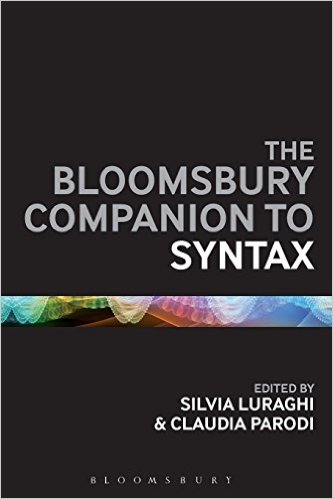 The Bloomsbury Companion to Syntax, edited by Silvia Luraghi and Claudia Parodi (Bloomsbury Academic, 2013), 545 pages.
The Bloomsbury Companion to Syntax, edited by Silvia Luraghi and Claudia Parodi (Bloomsbury Academic, 2013), 545 pages.
This volume came out at the same time as, and as a good complementary volume to the Bloomsbury Companion to Lexicography. Although there is not much overlap in the content, they are two important fields in linguistics (or in lexicography’s case, a field associated with linguistics) that those of us in biblical studies must take heed of.
As the introduction states, “Syntax is perhaps the field of linguistics that has generated the biggest number of competing theoretical frameworks, to the effect that mutual communication is often virtually inexistent” (1). This assessment is slightly more pessimistic than in other books, for example, in Donna Jo Napoli’s Syntax: Theory and Problems. She notes the variety of theoretical frameworks and uses Chomsky herself, but notes that her framework could be compatible with other systems (p. 5).
In this companion, authors use a variety of frameworks, some still using formal approaches and some using functional approaches. The hope of the editors is that there would be more dialogue between frameworks, rather than isolated pockets of approaches to syntax.
It may seem obvious by this point that one will need a rudimentary knowledge of syntax to make use of this volume. If one is not aware of the basic tenets of the different syntactical frameworks, these essays will be difficult to digest and compare. In that sense, the companion is more for linguistics students and professors or non-specialist linguists.
But those of us who teach any language must be familiar with syntax, even if we don’t explicitly profess a syntactical system, such as generative grammar or something else. When we teach Wallace’s Beyond the Basics or Williams’ Hebrew Syntax, we are obviously working with syntax. It would therefore be worth the time investment to study an introductory syntax (such as Napoli’s above) and then to use this companion to get caught up on the latest research in various issues of syntax.
The issues are various and the essays are split into three parts: (1) Research Methods in Syntax; (2) Current Issues and Research in Syntax; (3) New Directions in Syntactic Research. The first part will be of less interested to non-linguistic specialists, since they deal with forming hypotheses about syntactical theories and syntax methodologies.
Part two, however, is quite relevant. Essays on word order, scrambling, constituents, V2 types, negation, middle and reflexive (dealing with Attic Greek), causatives, coordination, adverbial subordination, and clitics (again, Attick Greek gets some attention) are all relevant for Hebrew and Greek syntax. And obviously, when these features are considered in other languages by these specialists, we gain a better understanding of language as a whole and how our languages contrast with others in the world.
Part three will be of less interest, as part one, since it deals with the latest directions in syntactic research, something of interest mostly to specialists in the field.
Most essays are brief and clearly written. In that sense, it is accessible. However, there are a few setbacks to this volume. In contrast to the companion on lexicography, there is no annotated bibliography or chapters on resources. These were a great addition to the other companion and should be included in every volume to give readers direction to the best resources.
Also, there is no history of research section. Readers may want to know what happened pre- and post-Chomsky since he was so influential (indeed, a pivot-point in grammatical research). It is surprising to see a companion such as this without any history of research section to give the reader some context for the essays on modern research. Nevertheless, the essays that are included are worth the price of the book, particularly those in section two. I recommend it to anyone who studies or teaches the syntax of any language.
Find it here on Amazon.
